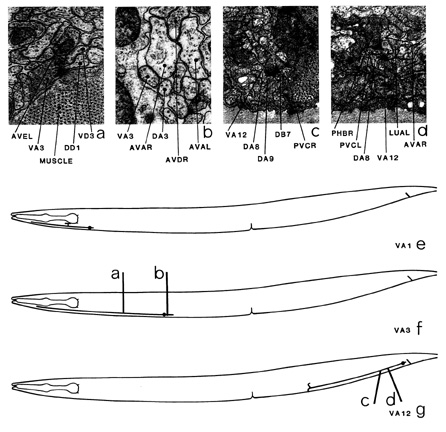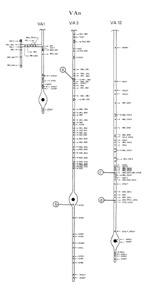VAn is a set of twelve motoneurons, distributed along the ventral
cord, which innervate ventral body muscles. A typical VAn neuron
(e.g. VA3 (f)) has a short, posteriorly directed process that
runs in the ventral part of the process bundle. This process is
always postsynaptic and receives synaptic input from AVA (*c)
and AVD (*a); in addition, VA1 to VA3 receive
synaptic input from AVE (*c). There are also gap junctions to AVA (b), ASn (*d) and other VAn neurons, but these may be
situated on the anterior as well as the posterior processes. A long,
anteriorly directed process leaves the cell body and moves to a
position adjacent to the bounding basal lamina on the right-hand side
of the cord, in between an adjacent ventral VBn process and a dorsal
VDn process (figure 18). VAn processes have NMJs when they are in
this position; the NMJs are nearly all dyadic synapses with DDn neurons as the other postsynaptic partner (a). The anterior process
of a VAn eventually moves away from the NMJ region, its place being
taken by the process of the adjacent anterior VAn. The anterior
distal regions of the VAn processes then run for some distance in the
ventral region of the cord before ending with little or no synaptic
contacts with other cells. The VAn neurons at either end of the cord
(i.e. VA1 and VA12) are somewhat different from the rest. VA1 (e), in
common with VB1 and VD1 which are all in the region immediately
posterior to the excretory duct, branches and has its NMJs arranged
transversely along a confined region along the dorsal surface of the
nerve cord. VA12 (g) has a similar morphology to VA2-VA11 but has
some additional types of synaptic contact. It receives synaptic input
from PHC, PHB, AVA and possibly VD12 and VD13. It has dyadic
NMJs with VD12, VD13 and DD6 as the other postsynaptic partners. In
addition VA12 also synapses onto DA8 (c), DA9 (c), DB7 (c), AS11, and PVC (d) in various combinations at multiple synapses. There
are gap junctions to AVA, PHC and VB11. Magnifications: (a, c,
d) x 25500, (b) x 17000.

Click pictures for higher resolution images


